2011年普通高等学校招生全国统一考试英语试题(江西卷)(精校版 无答案)
- 格式:doc
- 大小:128.50 KB
- 文档页数:8
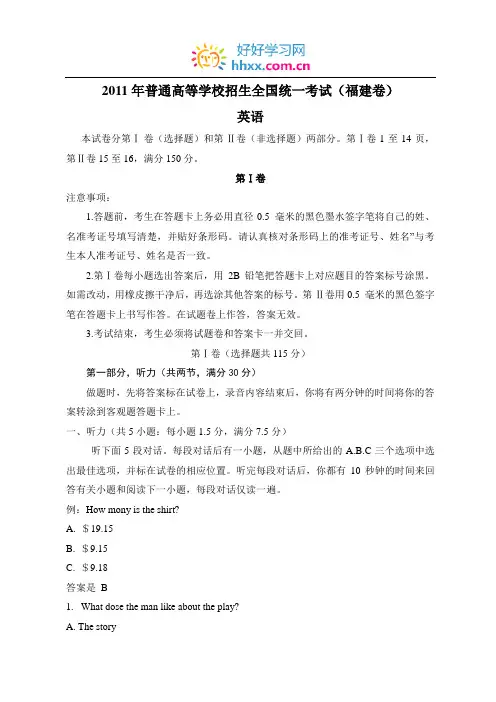
2011年普通高等学校招生全国统一考试(福建卷)英语本试卷分第Ⅰ卷(选择题)和第Ⅱ卷(非选择题)两部分。
第Ⅰ卷1至14页,第Ⅱ卷15至16,满分150分。
第Ⅰ卷注意事项:1.答题前,考生在答题卡上务必用直径0.5 毫米的黑色墨水签字笔将自己的姓、名准考证号填写清楚,并贴好条形码。
请认真核对条形码上的准考证号、姓名”与考生本人准考证号、姓名是否一致。
2.第Ⅰ卷每小题选出答案后,用2B铅笔把答题卡上对应题目的答案标号涂黑。
如需改动,用橡皮擦干净后,再选涂其他答案的标号。
第Ⅱ卷用0.5 毫米的黑色签字笔在答题卡上书写作答。
在试题卷上作答,答案无效。
3.考试结束,考生必须将试题卷和答案卡一并交回。
第Ⅰ卷(选择题共115分)第一部分,听力(共两节,满分30分)做题时,先将答案标在试卷上,录音内容结束后,你将有两分钟的时间将你的答案转涂到客观题答题卡上。
一、听力(共5小题:每小题1.5分,满分7.5分)听下面5段对话。
每段对话后有一小题,从题中所给出的A.B.C三个选项中选出最佳选项,并标在试卷的相应位置。
听完每段对话后,你都有10秒钟的时间来回答有关小题和阅读下一小题,每段对话仅读一遍。
例:How mony is the shirt?A. $19.15B. $9.15C. $9.18答案是B1.What dose the man like about the play?A. The storyB. The endingC. The actor2. Which place are the speakers trying to find?A .A hotel.B. A bankC. A restaurant.3. At what time will the two speakers meet?A.5:20.B.5:10.C.4:40.4. What will the man do?A. Change the planB. Wait for a phone call.C. Sort things out.5. What does the woman want to do?A. See a film with the man.B. Offer the man some help.C. Listen to some great music.第二节(共15小题:每小题1.5分,满分22.5分)听下面5段对话,每段对话后有几个小题,从题中所给的A、B、C三个选项中选出最佳选项,并标在试卷的相应位置。
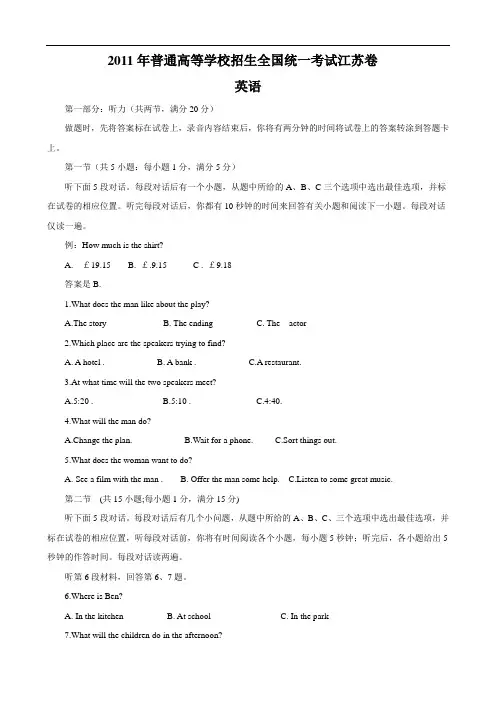
2011年普通高等学校招生全国统一考试江苏卷英语第一部分:听力(共两节,满分20分)做题时,先将答案标在试卷上,录音内容结束后,你将有两分钟的时间将试卷上的答案转涂到答题卡上。
第一节(共5小题:每小题1分,满分5分)听下面5段对话。
每段对话后有一个小题,从题中所给的A、B、C三个选项中选出最佳选项,并标在试卷的相应位置。
听完每段对话后,你都有10秒钟的时间来回答有关小题和阅读下一小题。
每段对话仅读一遍。
例:How much is the shirt?A.£19.15B. £.9.15 C . £9.18答案是B.1.What does the man like about the play?A.The storyB. The endingC. The actor2.Which place are the speakers trying to find?A. A hotel .B. A bank .C.A restaurant.3.At what time will the two speakers meet?A.5:20 .B.5:10 .C.4:40.4.What will the man do?A.Change the plan.B.Wait for a phone.C.Sort things out.5.What does the woman want to do?A. See a film with the man .B. Offer the man some help.C.Listen to some great music.第二节(共15小题;每小题1分,满分15分)听下面5段对话。
每段对话后有几个小问题,从题中所给的A、B、C、三个选项中选出最佳选项,并标在试卷的相应位置,听每段对话前,你将有时间阅读各个小题,每小题5秒钟;听完后,各小题给出5秒钟的作答时间。
每段对话读两遍。
听第6段材料,回答第6、7题。
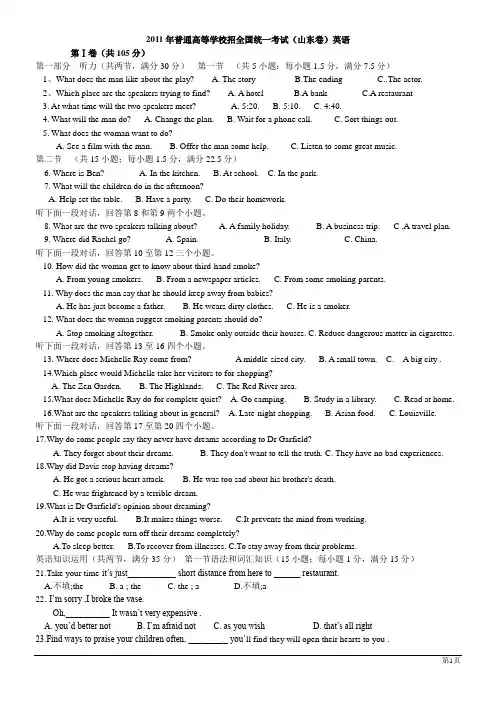
2011年普通高等学校招全国统一考试(山东卷)英语第Ⅰ卷(共105分)第一部分听力(共两节,满分30分)第一节(共5小题:每小题1.5分,满分7.5分)1、What does the man like about the play? A. The story B.The ending C..The actor.2、Which place are the speakers trying to find? A. A hotel B.A bank C.A restaurant3. At what time will the two speakers meet? A. 5:20. B. 5:10. C. 4:40.4. What will the man do? A. Change the plan. B. Wait for a phone call. C. Sort things out.5. What does the woman want to do?A. See a film with the man.B. Offer the man some help.C. Listen to some great music.第二节(共15小题;每小题1.5分,满分22.5分)6. Where is Ben? A. In the kitchen. B. At school. C. In the park.7. What will the children do in the afternoon?A. Help set the table.B. Have a party.C. Do their homework.听下面一段对话,回答第8和第9两个小题。
8. What are the two speakers talking about? A. A family holiday. B. A business trip. C .A travel plan.9. Where did Rachel go? A. Spain. B. Italy. C. China.听下面一段对话,回答第10至第12三个小题。
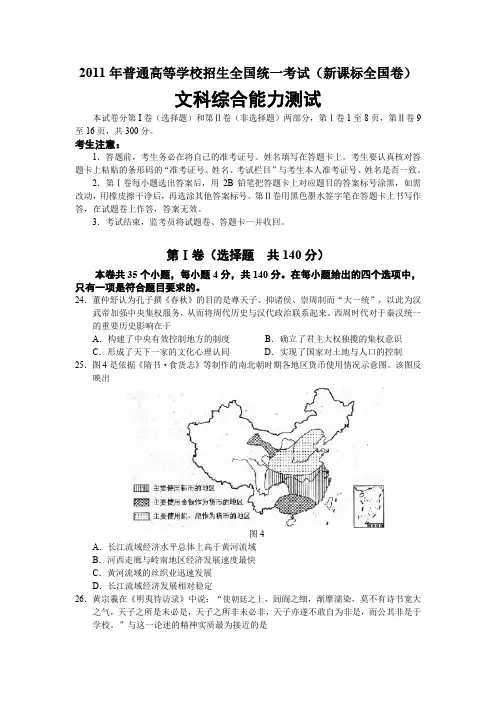
2011年普通高等学校招生全国统一考试(新课标全国卷)文科综合能力测试本试卷分第I卷(选择题)和第Ⅱ卷(非选择题)两部分,第Ⅰ卷1至8页,第Ⅱ卷9至16页,共300分。
考生注意:1.答题前,考生务必在将自己的准考证号、姓名填写在答题卡上。
考生要认真核对答题卡上粘贴的条形码的“准考证号、姓名、考试栏目”与考生本人准考证号、姓名是否一致。
2.第Ⅰ卷每小题选出答案后,用2B铅笔把答题卡上对应题目的答案标号涂黑,如需改动,用橡皮擦干净后,再选涂其他答案标号。
第Ⅱ卷用黑色墨水签字笔在答题卡上书写作答,在试题卷上作答,答案无效。
3.考试结束,监考员将试题卷、答题卡一并收回。
第Ⅰ卷(选择题共140分)本卷共35个小题,每小题4分,共140分。
在每小题给出的四个选项中,只有一项是符合题目要求的。
24.董仲舒认为孔子撰《春秋》的目的是尊天子、抑诸侯、崇周制而“大一统”,以此为汉武帝加强中央集权服务,从而将周代历史与汉代政治联系起来。
西周时代对于秦汉统一的重要历史影响在于A.构建了中央有效控制地方的制度B.确立了君主大权独揽的集权意识C.形成了天下一家的文化心理认同D.实现了国家对土地与人口的控制25.图4是依据《隋书·食货志》等制作的南北朝时期各地区货币使用情况示意图。
该图反映出图4A.长江流域经济水平总体上高于黄河流域B.河西走廊与岭南地区经济发展速度最快C.黄河流域的丝织业迅速发展D.长江流域经济发展相对稳定26.黄宗羲在《明夷待访录》中说:“使朝廷之上,闾阎之细,渐摩濡染,莫不有诗书宽大之气,天子之所是未必是,天子之所非未必非,天子亦遂不敢自为非是,而公其非是于学校。
”与这一论述的精神实质最为接近的是A.天下兴亡,匹夫有责B.民为邦本C.天下为公D.民贵君轻27.苏格拉底在受审时申辩说:“打一个可笑的比喻,我就像一只牛虻,整天到处叮住你们不放,唤醒你们、说明你们、指责你们……我要让你们知道,要是杀死像我这样的人,那么对你们自己造成的损害将会超过对我的残害。
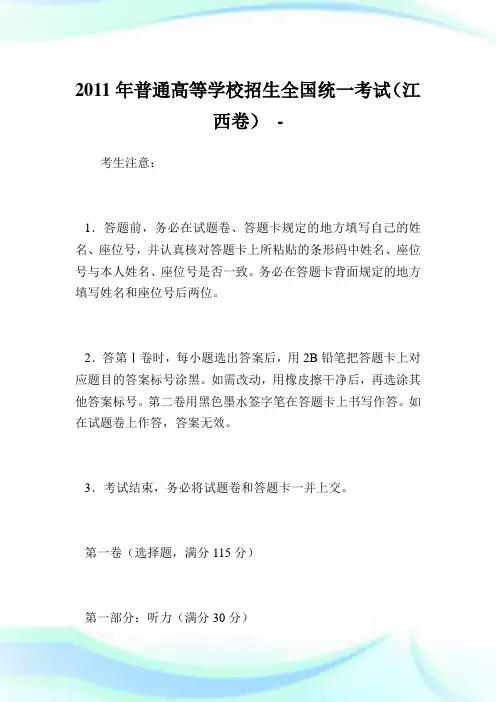
2011年普通高等学校招生全国统一考试(江西卷)-考生注意:1.答题前,务必在试题卷、答题卡规定的地方填写自己的姓名、座位号,并认真核对答题卡上所粘贴的条形码中姓名、座位号与本人姓名、座位号是否一致。
务必在答题卡背面规定的地方填写姓名和座位号后两位。
2.答第Ⅰ卷时,每小题选出答案后,用2B铅笔把答题卡上对应题目的答案标号涂黑。
如需改动,用橡皮擦干净后,再选涂其他答案标号。
第二卷用黑色墨水签字笔在答题卡上书写作答。
如在试题卷上作答,答案无效。
3.考试结束,务必将试题卷和答题卡一并上交。
第一卷(选择题,满分115分)第一部分:听力(满分30分)做题时,先将答案划在试卷上。
录音内容结束后,你将有两分钟的时间将试卷上的答案转涂到答题卡上。
第一节(共5小题;每小题1.5分,满分7.5分)听下面5段对话。
每段对话后有一个小题,从题中所给的A、B、C三个选项中选出最佳选项,并标在试卷的相应位置。
听完每段对话后,你都有10秒钟的时间来回答有关小题和阅读下一小题。
每段对话仅读一遍。
例:How much is the shirt?A.£19.15. B.£9.15. C.£9.18.答案是B。
1.What does the man like about the play?A.The story. B.The ending. C.The actor.2.Which place are the speakers trying to find?A.A hotel. B.A bank. C.A restaurant.3.At what time will the two speakers meet?A.5:20. B.5:10. C.4:40.4.What will the man do?A.Change the plan. B.Wait for a phone call. C.Sort things out. 5.What does the woman want to do?A.See a film with the man. B.Offer the man some help. C.Listento some great music.第二节(共15小题;每题1.5分,满分22.5分)听下面5段对话。
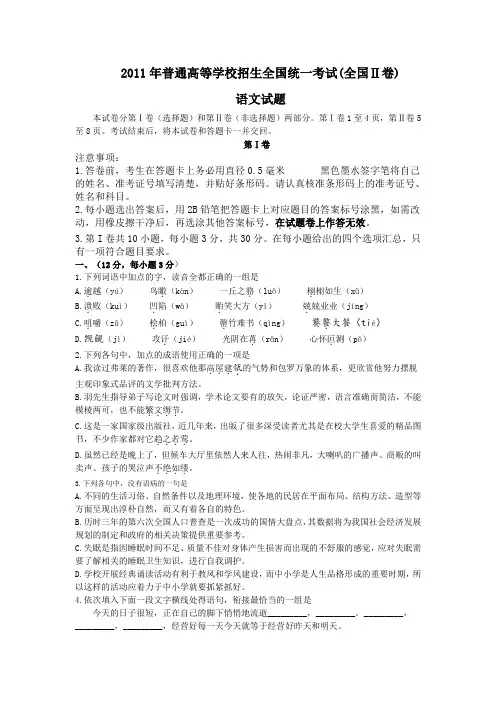
2011年普通高等学校招生全国统一考试(全国Ⅱ卷)语文试题本试卷分第Ⅰ卷(选择题)和第Ⅱ卷(非选择题)两部分。
第Ⅰ卷1至4页,第Ⅱ卷5至8页。
考试结束后,将本试卷和答题卡一并交回。
第Ⅰ卷注意事项:1.答卷前,考生在答题卡上务必用直径0.5毫米黑色墨水签字笔将自己的姓名、准考证号填写清楚,并贴好条形码。
请认真核准条形码上的准考证号、姓名和科目。
2.每小题选出答案后,用2B铅笔把答题卡上对应题目的答案标号涂黑,如需改动,用橡皮擦干净后,再选涂其他答案标号,在试题卷上作答无效.........。
3.第I卷共10小题,每小题3分,共30分。
在每小题给出的四个选项汇总,只有一项符合题目要求。
一、(12分,每小题3分)1.下列词语中加点的字,读音全都正确的一组是A.逾.越(yú)鸟瞰.(kàn)一丘之貉.(luǒ)栩.栩如生(xǔ)B.溃.败(kuì)凹.陷(wā)贻.笑大方(yī)兢.兢业业(jíng)C.咀.嚼(zǔ)桧.柏(guì)罄.竹难书(qìng)饕餮.大餐(tié)D.觊觎(jì)攻讦.(jié)光阴在苒.(rǎn)心怀叵.测(pǒ)2.下列各句中,加点的成语使用正确的一项是瓴.的气势和包罗万象的体系,更欣赏他努力摆脱A.我读过弗莱的著作,很喜欢他那高屋建...主观印象式品评的文学批判方法。
B.羽先生指导弟子写论文时强调,学术论文要有的放矢,论证严密,语言准确而简洁,不能模棱两可,也不能繁文缛节....。
C.这是一家国家级出版社,近几年来,出版了很多深受读者尤其是在校大学生喜爱的精品图书,不少作家都对它趋之若莺....。
D.虽然已经是晚上了,但候车大厅里依然人来人往,热闹非凡,大喇叭的广播声、商贩的叫卖声、孩子的哭泣声不绝如缕....。
3.下列各句中,没有语病的一句是A.不同的生活习俗、自然条件以及地理环境,使各地的民居在平面布局、结构方法、造型等方面呈现出淳朴自然,而又有着各自的特色。
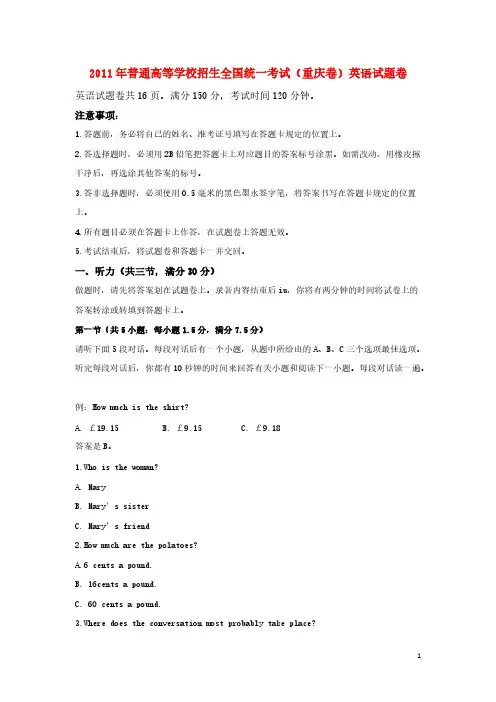
2011年普通高等学校招生全国统一考试(重庆卷)英语试题卷英语试题卷共16页。
满分150分,考试时间120分钟。
注意事项:1.答题前,务必将自己的姓名、准考证号填写在答题卡规定的位置上。
2.答选择题时,必须用2B铅笔把答题卡上对应题目的答案标号涂黑。
如需改动,用橡皮擦干净后,再选涂其他答案的标号。
3.答非选择题时,必须使用0.5毫米的黑色墨水签字笔,将答案书写在答题卡规定的位置上。
4.所有题目必须在答题卡上作答,在试题卷上答题无效。
5.考试结束后,将试题卷和答题卡一并交回。
一、听力(共三节,满分30分)做题时,请先将答案划在试题卷上。
录音内容结束后iu,你将有两分钟的时间将试卷上的答案转涂或转填到答题卡上。
第一节(共5小题:每小题1.5分,满分7.5分)请听下面5段对话。
每段对话后有一个小题,从题中所给出的A、B、C三个选项最佳选项。
听完每段对话后,你都有10秒钟的时间来回答有关小题和阅读下一小题。
每段对话读一遍。
例:How much is the shirt?A. £19.15B. £9.15C. £9.18答案是B。
1.Who is the woman?A. MaryB. Mary’s sisterC. Mary’s friend2.How much are the polatoes?A.6 cents a pound.B. 16cents a pound.C. 60 cents a pound.3.Where does the conversation most probably take place?A.In a restaurant.B. On a farm.C.At home.4.What does the woman ask the man to do ?A.Have his hair cut.B.Go to the library.C.Buy some food.5.What is the conversation mainly about?A.Vacation planB.Summer tripC.Part-time job第二节(共12小题;每小题1.5分你,满分18分)请听下面4段对话或独白。
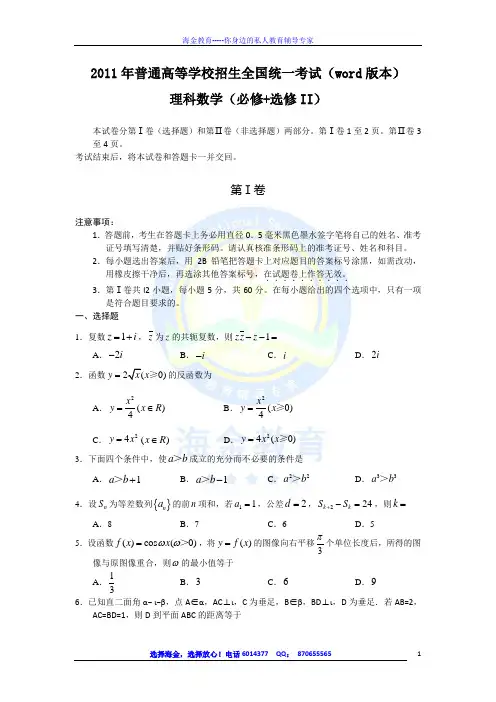
2011年普通高等学校招生全国统一考试(word 版本)理科数学(必修+选修II )本试卷分第Ⅰ卷(选择题)和第Ⅱ卷(非选择题)两部分。
第Ⅰ卷1至2页。
第Ⅱ卷3至4页。
考试结束后,将本试卷和答题卡一并交回。
第Ⅰ卷注意事项:1.答题前,考生在答题卡上务必用直径0.5毫米黑色墨水签字笔将自己的姓名、准考证号填写清楚,并贴好条形码。
请认真核准条形码上的准考证号、姓名和科目。
2.每小题选出答案后,用2B 铅笔把答题卡上对应题目的答案标号涂黑,如需改动,用橡皮擦干净后,再选涂其他答案标号,在试题卷上作答无效。
.......... 3.第Ⅰ卷共l2小题,每小题5分,共60分。
在每小题给出的四个选项中,只有一项是符合题目要求的。
一、选择题1.复数1z i =+,z 为z 的共轭复数,则1z z z --=A .2i -B .i -C .iD .2i2.函数0)y x x =≥的反函数为A .2()4xy x R =∈ B .2(0)4xy x =≥C .24y x =()x R ∈D .24(0)y x x =≥3.下面四个条件中,使a b >成立的充分而不必要的条件是A .1a b +>B .1a b ->C .22a b >D .33a b >4.设n S 为等差数列{}n a 的前n 项和,若11a =,公差2d =,224k k S S +-=,则k =A .8B .7C .6D .55.设函数()cos (0)f x x ωω=>,将()y f x =的图像向右平移3π个单位长度后,所得的图像与原图像重合,则ω的最小值等于A .13B .3C .6D .96.已知直二面角α− ι−β,点A ∈α,AC ⊥ι,C 为垂足,B ∈β,BD ⊥ι,D 为垂足.若AB=2,AC=BD=1,则D 到平面ABC 的距离等于A .3B .3C .3D .17.某同学有同样的画册2本,同样的集邮册3本,从中取出4本赠送给4位朋友每位朋友1本,则不同的赠送方法共有A .4种B .10种C .18种D .20种8.曲线y=2x e -+1在点(0,2)处的切线与直线y=0和y=x 围成的三角形的面积为A .13B .12C .23D .19.设()f x 是周期为2的奇函数,当0≤x≤1时,()f x =2(1)x x -,则5()2f -=A .-12B .14-C .14D .1210.已知抛物线C :24y x =的焦点为F ,直线24y x =-与C 交于A ,B 两点.则cos A F B ∠=A .45B .35C .35-D .45-11.已知平面α截一球面得圆M ,过圆心M 且与α成060二面角的平面β截该球面得圆N .若该球面的半径为4,圆M 的面积为4π,则圆N 的面积为A .7πB .9πC .11πD .13π12.设向量a ,b ,c 满足a =b =1,a b =12-,,a c b c --=060,则c 的最大值等于A .2B 3C 2D .1第Ⅱ卷注意事项:1.答题前,考生先在答题卡上用直径0.5毫米黑色墨水签字笔将自己的姓名、准考 证号填写清楚,然后贴好条形码。
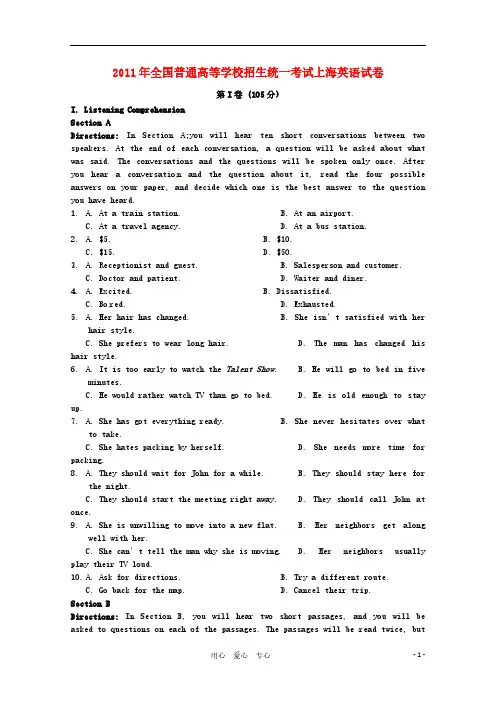
2011年全国普通高等学校招生统一考试上海英语试卷第I卷 (105分)I. Listening ComprehensionSection ADirections: In Section A;you will hear ten short conversations between two speakers. At the end of each conversation, a question will be asked about what was said. The conversations and the questions will be spoken only once. After you hear a conversatio n and the question about it, read the four possible answers on your paper, and decide which one is the best answer to the question you have heard.1. A. At a train station. B. At an airport.C. At a travel agency.D. At a bus station.2. A. $5. B. $10.C. $15.D. $50.3. A. Receptionist and guest. B. Salesperson and customer.C. Doctor and patient.D. Waiter and diner.4. A. Excited. B. Dissatisfied.C. Bo red.D. Exhausted.5. A. Her hair has changed. B. She isn’t satisfied with herhair style.C. She prefers to wear long hair.D. The man has changed his hair style.6. A. It is too early to watch the Talent Show. B. He will go to bed in fiveminutes.C. He would rather watch TV than go to bed.D. He is old enough to stay up.7. A. She has got everything ready. B. She never hesitates over whatto take.C. She hates packing by herself.D. She needs more time for packing.8. A. They should wait for John for a while. B. They should stay here forthe night.C. They should start the meeting right away.D. They should call John at once.9. A. She is unwilling to move into a new flat. B. Her neighbors get alongwell with her.C. She can’t tell the man why she is moving.D. Her neighbors usually play their TV loud.10.A. Ask for directions. B. Try a different route.C. Go back for the map.D. Cancel their trip.Section BDirections: In Section B, you will hear two short passages, and you will be asked to questions on each of the passages. The passages will be read twice, butthe questions will be spoken only once. When you hear a question, read the four possible answers on your paper and decide which one would be the blest answer to the question you have heard.Questions 11 through 13 are based on the following passage.11.A. A political system. B. Religion.C. Working language.D. Race.12.A. Discuss current issues. B. Join in a writing competition.C. Attend an arts and crafts competition.D. Celebrate their friendship.13.A. The Commonwealth Games. B. An important holiday.C. The Commonwealth members.D. An international association. Questions 14 through 16 are based on the following news.14.A. Equipping students with knowledge. B. Qualifying students forcertain jobs.C. Developing students’ habits of mind.D. Helping students to go to graduate school.15.A. The ability to have critical analysis. B. Creative use ofleisure time.C. Logical use of information.D. Willingness to accept uncertainty.16.A. Goals to reach in a college education. B. Roles of knowledge instudents’ growth.C. Qualifications needed for a job.D. Importance of after-class activities.Section CDirections: In Section C, you will hear two longer conversations. The conversations will be read twice. After you hear each conversation, you are required to fill in the numbered blanks with the information you have heard. Write your answers on your answer sheet.Blanks 17 through 20 are based on the following conversation.Complete the form. Write ONE WORD for each answer.Complaint FormCaller: Mary WhitePhone No.: 17 .Location of Problem: A 18 restaurant , 449 Shanghai StreetDetails: It dumps its 19 on the street.It doesn’t put bottles and cans in 20 bins. Blanks 21 through 24 are based on the following conversation.Complete the form. Write NO MORE THAN THREE WORDS for each answer.How long does short memory last?It lasts only 21 .What is an example of medium term memory?Buying bread, a sort of 22 of things to do.What is long term memory concerned with? 23 that happen in your life such as your wedding.How is long term memory differentIt 24 .from the others?II. Grammar and VocabularySection ADirections: Beneath each of the following sentences there are four choices marked A, B, C and D. Choose the one answer that best completes the sentence.25.Graduation is a good time to thank those who have helped you ______ the toughyears.A. throughB. upC. withD. from26.To stay awake, he finished a cup of coffee and ordered ______.A. the otherB. otherC. the othersD. another27.It’s no use ______ without taking action.A. complainB. complainingC. being complainedD. to be complained28.I ______ worry about my weekend—I always have my plans ready before it comes.A. can’tB. mustn’tC. daren’tD. needn’t29.When Mom looked back on the early days of their marriage, she wondered howthey had managed with ______ money.A. so fewB. such fewC. so littleD. such little30.It doesn’t matter if they want to come to your party, ______?A. doesn’t itB. does itC. don’t theyD.do they31.After getting lost in a storm, a member of the navy team ______ four dayslater.A. rescuedB. was rescuedC. has rescuedD. had been rescued32.The rare fish, ______ from the cooking pot, has been returned to the sea.A. savedB. savingC. to be savedD.having saved33.At one point I made up my mind to talk to Uncle Sam. Then I changed my mind,______ that he could do nothing to help.A. to realizeB. realizedC. realizingD. being realized34.Did you predict that many students ______ up for the dance competition?A. would signB. signedC. have signedD. had signed35.There is clear evidence ______ the most difficult feeling of all to interpretis bodily pain.A. whatB. ifC. howD. that36.If a lot of people say a film is not good, I won’t bother to see it, orI’ll wait ______ it comes out on DVD.A. whetherB. afterC. thoughD. until37.The police officers in our city work hard ______ the rest of us can live asafe life.A. in caseB. as ifC. in order thatD.only if38.The message you intend to convey through words may be the exact opposite of______ others actually understand.A. whyB. thatC. whichD. what39.You’ll find taxis waiting at the bus station ______ you can hire to reachyour host family.A. whichB. whereC. whenD. as40.Today we have chat rooms, text messaging, emailing… but we seem ______ theart of communicating face-to-face.A. losingB. to be losingC. to be lostD.having lostSection BDirections: Complete the following passage by using the words in the box. Eachword can only be used once. Note that there is one word more than you need.A. launchedB. unpleasantC. applyingD. technicallyE. impactF. coatingG. fixedH. miraculouslyI. superiorJ. advancesHow would you like to wear the same underwear (内衣裤) for weeks? Owing tothe work that has gone into developing intelligent materials, this may not be as41 as it sounds. Self-cleaning clothes have now been created, and these new materials provide 42 resistance to dirt as well as water. As a result, they require much less cleaning than traditional materials.The creation of self-cleaning clothes provides an example of how naturehelps scientists develop better products. This self-cleaning nature is known asthe “lotus effect”. The name comes, of course, from the lotus leaves, whichare famous for growing in muddy lakes and rivers while remaining almost 43clean. By observing nature, scientists are 44 the qualities of the lotusleaves to the materials they have engineered. Because of this, some remarkablenew products have been 45 . Among them are special windows that are resistantto dirt and water. A special 46 on these windows not only prevents dirt from sticking to their surfaces, but also allows dust to be easily washed off by therain. In fact, these new windows have already been 47 to some cars. Evenwhen traveling at high speed through rain, these cars never have to use their windshield wipers (雨刮器).Although we have already seen some practical applications, even more dramatic 48 will be made in the future, and they will, perhaps, change ourworld completely. Undoubtedly, technology is an important development, and itwill have an even bigger 49 on our lives.III. Reading ComprehensionSection ADirections: For each blank in the following passage there are four words or phrases marked A, B, C and D. Fill in each blank w ith the word or phrase that best fits the context.Everyone in business has been told that success is all about attracting and retaining (留住) customers. It sounds simple and achievable. But, 50 , wordsof wisdom are soon forgotten. Once companies have attracted customers they often 51 the second half of the story. In the excitement of beating off the competition, negotiating prices, securing orders, and delivering the product, managers tend to become carried away. They forget what they regard as the boring side of business— 52 that the customer remains a customer.53 to concentrate on retaining as well as attracting customers costs business huge amounts of money annually. It has been estimated that the average company loses between 10 and 30 per cent of its customers every years. In constantly changing 54 , this is not surprising. What is surprising is the fact that few companies have any idea how many customers they have lost.Only now are organizations beginning to wake up to those lost opportunities and calculate the 55implications. Cutting down the number of customers a company loses can make a big 56 in its performance. Research in the US found that a five per cent decrease in the number of defecting (流失的) customers led to 57 increases of between 25 and 85 per cent.In the US, Domino’s Pizza estimates that a regular customer is worth more than $5,000 over ten years. A customer who receives a poor quality product or service on their first visit and 58 never returns, is losing the company thousands of dollars in 59 profits (more if you consider how many people they are likely to tell about their bad experience).The logic behind cultivating customer 60 is impossible to deny. “In practice most companies’ marketing effort is focused on getting customers, with little attention paid to 61 them”, says Adrian Payne of Cornfield University’ School of Management. “Research suggests that there is a close relationship between retaining customers and making profits. 62 customers tend to buy more, are predictable and usually cost less to service than new customers. Furthermore, they tend to be less price 63 , and may provide free word-of-mouth advertising. Retaining customers also makes it 64 for competitors to enter a market or increase their share of a market.50.A. in particular B. in reality C. at least D.first of all51.A. emphasize B. doubt C. overlook D. believe52.A. denying B. ensuring C. arguing D. proving53.A. Moving B. Hoping C. Starting D. Failing54.A. markets B. tastes C. prices D.expenses55.A. culture B. social C. financial D.economical56.A. promise B. plan C. mistake D.differe nce57.A. cost B. opportunity C. profit D.budget58.A. as a result B. on the whole C. in conclusion D. on thecontrary59.A. huge B. potential C. extra D.reasonable60.A. beliefs B. loyalty C. habits D.interest61.A. altering B. understanding C. keeping D.attracting62.A. Assumed B. Respected C. Established D.Unexpected63.A. agreeable B. flexible C. friendly D. sensitive64.A. unfair B. difficult C. essential D.convenientSection BDirections:Read the following three passages. Each passage is followed by several questions or unfinished statements. For each of them there are four choices marked A, B, C and D. Choose the one that fits best according to the information given in the passage you have just read.AThe teacher who did the most to encourage me was, as it happened, my aunt. She was Myrtle C. Manigault, the wife of my mother’s brother Bill. She taught in second grade at all-black Summer School in Camden, New Jersey.During my childhood and youth, Aunt Myrtle encouraged me to develop every aspect of my potential, without regard for what was considered practical or possible for black females. I liked to sing; she listened to my voice and pronounced it good. I couldn’t dance; she taught me the basic dancing steps. She took me to the theatre not just children’s theatre but adult comedies and dramas—and her faith that I could appreciate adult plays was not disappointed.My aunt also took down books from her extensive library and shared them with me. I had books at home, but they were all serious classics. Even as a child I had a strong liking for humor, and I’ll never forget the joy of discovering Don Marquis’s Archy & Mehitabel through her.Most important, perhaps, Aunt Myrtle provided my first opportunity to write for publication. A writer herself for one of the black newspapers, she suggested my name to the editor as a “youth columnist”. My column, begun when I wasfourteen, was supposed to cover teenage social activities—and it did—but it also gave me the freedom to write on many other subjects as well as the habit of gathering material, the discipline of meeting deadlines, and, after graduation from college six years later, a solid collection of published material that carried my name and was my passport to a series of writing jobs.Today Aunt Myrtle is still an enthusiastic supporter of her “favourite niece”. Like a diamond, she has reflected a bright, multifaceted (多面的) image of possibilities to every pupil w ho has crossed her path.65.Which of the following did Aunt Myrtle do to the author during her childhoodand youth?A. She lent her some serious classics.B. She cultivated her taste for music.C. She discovered her talent for dancing.D. She introduced her to adult plays.66.What does Archy and Mehitabel in Paragraph 3 probably refer to?A. A book of great fun.B. A writer of high fame.C. A serious masterpiece.D. A heartbreaking play.67.Aunt Myrtle recommended the author to a newspaper editor mainly to ______.A. develop her capabilities for writingB. give her a chance to collect materialC. involve her in teenage social activitiesD. offer her a series of writing jobs68.We can conclude from the passage that Aunt Myrtle was a teacher who ______.A. trained pupils to be diligent and well-disciplinedB. gave pupils confidence in exploiting their potentialC. emphasized what was practical or possible for pupils.D. helped pupils overcome difficulties in learningBHumpback whales Quick Facts [Size:14m~18m in length 30~50 tons in weight Humpback whales are sometimes called performers of the ocean. This is because they can make impressive movements when theydive. The name “humpback”, which is thecommon name for this whale, refers to the LivingOpen ocean andshallow coastline waters Environment:From warm tropical (热带的) waters, where they breed, to cold polar waters, where they eat.Diet:Shellfish, plants and fish of small size Hunting:Sometimes in groups, in which several whales form a circle under the water, blowing bubbles that form a “net” around a school of fish. The fish are then forced up to the surface in a concentrated mass.typical curve shape the whale’s back formsas it dives.Sometimes the humpback will dive with afantastic movement, known as a breach .During breaching the whale uses its powerfultail flukes to lift nearly two-thirds of itsbody out of the water in a giant leap. Abreach might also include a sideways twistwith fins stretched out like wings, as thewhale reaches the height of the breach.A humpback whale breathes air at thesurface of the water through two blowholeswhich are located near the top of the head.It blows a double stream of water that canrise up to 4 meters above the water.The humpback has a small dorsal finlocated towards the tail flukes about two-thirds of the way down its back. Otherdistinguishing features include largepectoral fins, which may be up to a third ofthe body length, and unique black and whitespots on the underside of the tail flukes.These markings are like fingerprints: no twoare the same.Humpback whales live in large groups.They communicate with each other throughcomplex “songs”.Current state:endangered; it is estimated that there are about5000~7000 humpbackwhales worldwide.69.According to Quick Facts , a humpback whale ______.A. cannot survive in waters near the shoreB. doesn’t live in the same waters all the timeC. lives mainly on underwater plantsD. prefers to work alone when hunting food70.To make a breach , a humpback whale must ______.A. use its tail flukes to leap out of the waterB. twist its body sideways to jump high.C. blow two streams of waterD. communicate with a group of humpbacks.71.From the passage we can learn that a humpback whale ______.A. has its unique markings on it tail flukesB. has black and white fingerprintsC. gets its name from the way it huntsD. is a great performer due to its songsCHuman remains of ancient settlements will be reburied and lost to science under a law that threatens research into the history of humans in Britain, a group of leading archeologists(考古学家) says. In a letter addressed to the justice secretary, Ken Clarke, 40 archaeologists write of their “deep and widespread concern” about the issue. It centers on the law introduced by the Ministry of Justice in 2008 which requires all human remains unearthed in England and Wales to be reburied within two years, regardless of their age. The decision means scientists have too little time to study bones and other human remains of national and cultural significance.“Your current requirement that all archaeologically unearthed human remains should be reburied, whether after a standard period of two years or a further special extension, is contrary to basic principles of archaeological and scientific research and of museum practice,” they write.The law applies to any pieces of bone uncovered at around 400 dig sites, including the remains of 60 or so bodies found at Stonehenge in 2008 that date back to 3,000 BC. Archaeologists have been granted a temporary extension to give them more time, but eventuallly the bones will have to be returned to the ground. The arrangements may result in the waste of future discoveries at sites such as Happisburgh in Norfolk, where digging is continuing after the discovery of stone tools made by early humans 950,000 years ago. If human remains were found at Happisburgh, they would be the oldest in northern Europe and the first indication of what this species was. Under the current practice of the law those remains would have to be reburied and effectively destroyed.Before 2008, guidelines allowed for the proper preservation and study of bones of sufficient age and historical interest, while the Burial Act 1857 applied to more recent remains. The Ministry of Justice assured archaeologists two ye ars ago that the law was temporary, but has so far failed to revise it.Mike Parker Pearson, an archaeologist at Sheffield University, said: “Archaeologists have been extremely patient because we were led to believe the ministry was sorting out this problem, but we feel that we cannot wait any longer.”The ministry has no guidelines on where or how remains should be reburied, or on what records should be kept.72.According to the passage, scientists are unhappy with the law mainly because______.A. it is only a temporary measure on the human remainsB. it is unreasonable and thus destructive to scientific researchC. it was introduced by the government without their knowledgeD. it is vague about where and how to rebury human remains73.Which of the following statements is true according to the passage?A. Temporary extension of two years will guarantee scientists enough time.B. Human remains of the oldest species were dug out at Happisburgh.C. Human remains will have to be reburied despite the extension of time.D. Scientists have been warned that the law can hardly be changed.74.What can be inferred about the British law governing human remains?A. The Ministry of Justice did not intend it to protect human remains.B. The Burial Act 1857 only applied to remains uncovered before 1857.C. The law on human remains hasn’t changed in recent decades.D. The Ministry of Justice has not done enough about the law.75.Which of the following might be the best title of the passage?A. New discoveries should be reburied, the government demands.B. Research time should be extended, scientists require.C. Law on human remains needs thorough discussion, authorities say.D. Law could bury ancient secrets for ever, archeologists warn.Se ction CDirections: Read the following text and choose the most suitable heading from A-F for each paragraph. There is one extra heading which you do not need.A. Manufacturing industry in information economyB. News in the age of informationC. Argument about individual accounts and theirreliabilityD. Be your own investigative journalistE. Don’t believe everything you read in thenewspapers.F. Information is presented in an entertainingway.76.______With the arrival of the age of “information economy”, intellectual work is becoming a more important source of wealth than manufacturing. Organizations in all walks of life are doing more to spread their inf ormation. So people of the Public Relations are hired to speak for them. A lot of our news is actually collected from press releases and reports of events intentionally staged for journalists. In the information age, journalists spend their time, not investigating, but passing on the words of a spokesperson.77.______There is a joke in the novel Scoop about the newspaper’s owner, Lord Copper. The editors can never disagree with him. When he’s right about something they answer “definitely”, and when he’s wrong they say “to some extent, Lord Copper.” It seems reasonable to suppose that, in the real world, the opinions of such powerful people still influence the journalists and editors who work for them.78.______In countries where the news is not officially controlled, it may be provided by commercial organizations who depend on advertising. The news has to attract viewers and maintain its audience ratings. I suspect that some stories get air-time just because there happen to be exciting pictures to show. In Britain, wehave the tabloid newspapers which millions of people read simply for entertainment. There is progressively less room for historical background, or statistics, which are harder to present as a sensational story.79.______There is an argument that with spreading access to the internet and cheap technology for recording sound and images we will all be able to find exactly the information we want. People around the world will be able to publish their own eye-witness accounts and compete with the widely-accepted news-gatherers on equal terms. But what it will mean also is that we’ll be subjected to a still greater amount of nonsense and lies. Any web log may contain the latest information of the year, or equally, a made-up story that you will never be able to check.80.______Maybe the time has come to do something about it, and I don’t just mean changing your choice of TV channel or newspaper. In a world where everyone wants you to listen to their version, you only have two choices: switch off altogether or start looking for sources you can trust. The investigative journalist of the future is everyone who wants to know the truth.Section DDirections: Read the passage carefully. Then answer the questions or complete the statements in the fewest possible words.Sociologists have long recognised that organisations of less than 200 individuals can operate through the free flow of information among the members. Once their size goes beyond this figure, the organizations are getting less flexible. So it seems necessary to prevent total disorder resulting from failures of communication.One solution to this problem would, of course, be to structure large organisations into smaller units of a size that can act as a group. By allowing these groups to build reliance on each other, larger organizations can be built up. However, merely having groups of, say, 150 will never of itself be a complete solution to the problems of the organization. Something else is needed: the people involved must be able to build direct personal relationships. To allow free flow of information, they have to be able to communicate with each other in a casual way. Maintaining too formal a structure of relationships inevitably prevents the way a system works.The importance of this was drawn to my attention two years ago by the case of a TV station. Whether by chance or by design, it so happened that there were almost exactly 150 people in the station. The whole process worked very smoothly as an organization for many years until they were moved into purpose-built accommodation. Then, for no apparent reason, the work seemed to be more difficult to do, not to say less satisfying.It was some time before they work out what the problem was. It turn out that, when the architects were designing the new building, they decided that thecoffee room where everyone ate their sandwiches at lunch times was an unnecessary luxury and so did away with it. And with that, they accidentally destroyed the close social networks that strengthened the whole organization. What had apparently been happening was that, as people gathered informally over their sandwiches in the coffee room, useful information was casually being exchanged.(Note: Answer the questions or complete the statements in NO MORE THAN EIGHT WORDS.)81.What size of an organization may lead to communication failures?82.What are the two solutions to the communication problem within a largeorganization?83.After the TV station moved into new accommodation, its operation___________________________.84.From the case of the TV station, we can conclude it is____________________________________ that make(s) an organization more successful.第Ⅱ卷 (共45分)I. TranslationDirections: Translate the following sentences into English, using the words given in the brackets.1.你为什么不在网上订票? (Why)2.我常把王海误认为他的双胞胎弟弟,因为他们长得太像了。
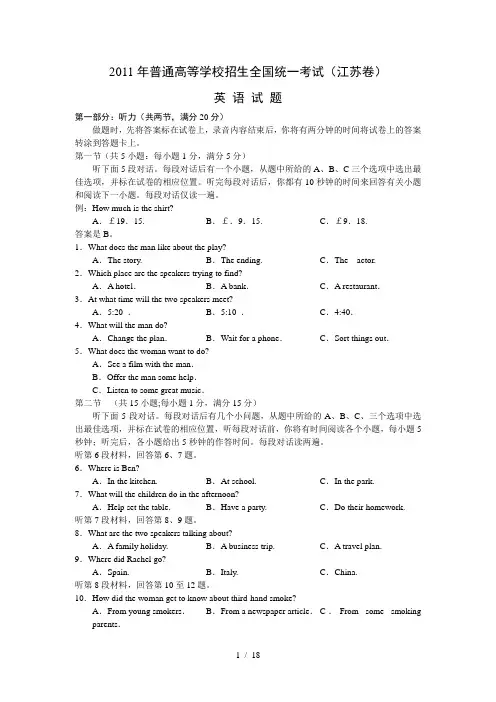
1 / 18 2011年普通高等学校招生全国统一考试(江苏卷) 英 语 试 题 第一部分:听力(共两节,满分20分) 做题时,先将答案标在试卷上,录音内容结束后,你将有两分钟的时间将试卷上的答案转涂到答题卡上。 第一节(共5小题:每小题1分,满分5分) 听下面5段对话。每段对话后有一个小题,从题中所给的A、B、C三个选项中选出最佳选项,并标在试卷的相应位置。听完每段对话后,你都有10秒钟的时间来回答有关小题和阅读下一小题。每段对话仅读一遍。 例:How much is the shirt? A.£19.15. B.£.9.15. C.£9.18. 答案是B。 1.What does the man like about the play? A.The story. B.The ending. C.The actor. 2.Which place are the speakers trying to find? A.A hotel. B.A bank. C.A restaurant. 3.At what time will the two speakers meet? A.5:20 . B.5:10 . C.4:40. 4.What will the man do? A.Change the plan. B.Wait for a phone. C.Sort things out. 5.What does the woman want to do? A.See a film with the man. B.Offer the man some help. C.Listen to some great music. 第二节 (共15小题;每小题1分,满分15分) 听下面5段对话。每段对话后有几个小问题,从题中所给的A、B、C、三个选项中选出最佳选项,并标在试卷的相应位置,听每段对话前,你将有时间阅读各个小题,每小题5秒钟;听完后,各小题给出5秒钟的作答时间。每段对话读两遍。 听第6段材料,回答第6、7题。 6.Where is Ben? A.In the kitchen. B.At school. C.In the park. 7.What will the children do in the afternoon? A.Help set the table. B.Have a party. C.Do their homework. 听第7段材料,回答第8、9题。 8.What are the two speakers talking about? A.A family holiday. B.A business trip. C.A travel plan. 9.Where did Rachel go? A.Spain. B.Italy. C.China. 听第8段材料,回答第10至12题。 10.How did the woman get to know about third-hand smoke? A.From young smokers. B.From a newspaper article. C.From some smoking parents. 2 / 18
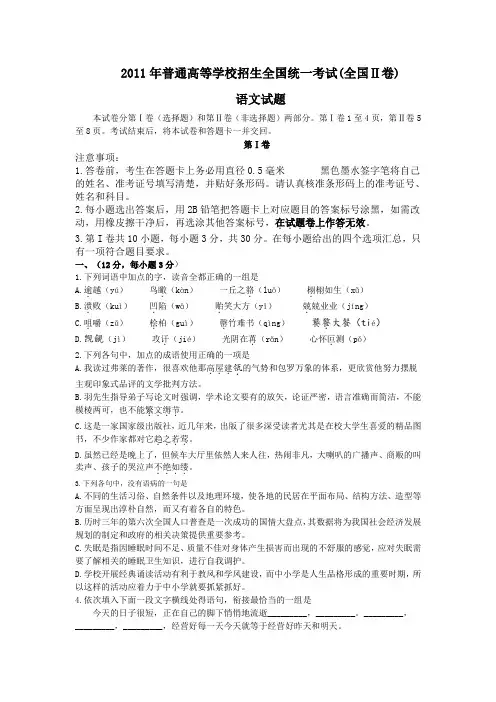
2011年普通高等学校招生全国统一考试(全国Ⅱ卷)语文试题本试卷分第Ⅰ卷(选择题)和第Ⅱ卷(非选择题)两部分。
第Ⅰ卷1至4页,第Ⅱ卷5至8页。
考试结束后,将本试卷和答题卡一并交回。
第Ⅰ卷注意事项:1.答卷前,考生在答题卡上务必用直径0.5毫米黑色墨水签字笔将自己的姓名、准考证号填写清楚,并贴好条形码。
请认真核准条形码上的准考证号、姓名和科目。
2.每小题选出答案后,用2B铅笔把答题卡上对应题目的答案标号涂黑,如需改动,用橡皮擦干净后,再选涂其他答案标号,在试题卷上作答无效.........。
3.第I卷共10小题,每小题3分,共30分。
在每小题给出的四个选项汇总,只有一项符合题目要求。
一、(12分,每小题3分)1.下列词语中加点的字,读音全都正确的一组是A.逾.越(yú)鸟瞰.(kàn)一丘之貉.(luǒ)栩.栩如生(xǔ)B.溃.败(kuì)凹.陷(wā)贻.笑大方(yī)兢.兢业业(jíng)C.咀.嚼(zǔ)桧.柏(guì)罄.竹难书(qìng)饕餮.大餐(tié)D.觊觎(jì)攻讦.(jié)光阴在苒.(rǎn)心怀叵.测(pǒ)2.下列各句中,加点的成语使用正确的一项是瓴.的气势和包罗万象的体系,更欣赏他努力摆脱A.我读过弗莱的著作,很喜欢他那高屋建...主观印象式品评的文学批判方法。
B.羽先生指导弟子写论文时强调,学术论文要有的放矢,论证严密,语言准确而简洁,不能模棱两可,也不能繁文缛节....。
C.这是一家国家级出版社,近几年来,出版了很多深受读者尤其是在校大学生喜爱的精品图书,不少作家都对它趋之若莺....。
D.虽然已经是晚上了,但候车大厅里依然人来人往,热闹非凡,大喇叭的广播声、商贩的叫卖声、孩子的哭泣声不绝如缕....。
3.下列各句中,没有语病的一句是A.不同的生活习俗、自然条件以及地理环境,使各地的民居在平面布局、结构方法、造型等方面呈现出淳朴自然,而又有着各自的特色。
2011年全国高等学校招生全国统一考试英语试题(江苏卷)第一卷注意事项:1.答题前,考生在答题卡上务必用直径O.5毫米黑色墨水签字笔将自己的姓名、准考证号填写清楚,并贴好条形码。
请认真核准条形码上的准考证号、姓名和科目。
2.每小题选出答案后,用2B铅笔把答题卡上对应题目的答案标号涂黑,如需改动,用橡皮擦干净后,再选涂其他答案标号,在试题卷上作答无效。
第一部分听力(共两节,满分30分)做题时,先将答案标在试卷上。
录音内容结束后,你将有两分钟的时间将试卷上的答案转涂到答题卡上。
第一节(共5小题;每小题1.5分,满分7.5分)听下面5段对话。
每段对话后有一个小题,从题中所给的A、B、C三个选项中选出最佳选项,并标在试卷的相应位置。
听完每段对话后,你都有10秒钟的时间来回答有关小题和阅读下一小题.每段对话仅读一遍。
例:How much is the shirt?A.£19.15. B.£9.15. C.£9.18.答案是B.1.What does the man like about the play?A.The story.B.The ending.C.The actor.2、Which place are the speakers trying to find?A.hotel.B.bank.C.restaurant.3.At what time will the two speakers meet?A.5:20.B.5:lO.C.4:40.4.what will the man do?A.Change the plan.B.Wait for a phone call.C.Sort things out.5.What does the woman want to do?A.See a film with the man.B.Offer the mall some help.C.Listen to some great music.第二节(共1 5小题:每小题1.5分,满分22.5分)听下面5段对话。
2011年普通高等学校招生全国统一考试(安徽卷)英语本试卷分第I卷(选择题)和第Ⅱ卷(非选择题)两部分,第Ⅰ卷第1至第14页,第Ⅱ卷第15页至第16页。
全卷满分1500分,考试时间120分钟。
考生注意事项:1.答题前,务必在试题卷,答题卡规定的地方填写自己的姓名、座位号,并认真核对答题卡上粘贴的条形码中姓名、座位号与本人姓名、座位号是否一致。
务必在答题卡背面规定的地方填写姓名和座位号后两位。
2.答第Ⅰ卷时,每小题选出答案后,用2B铅笔把答题卡上对应题目的答案标号涂黑。
如需改动,用橡皮擦干净后,再选涂其他答案的标号。
3.答第Ⅱ卷时,必须使用0.5毫米的黑色墨水签字笔在答题卡上....书写,要求字体工整、笔记清晰。
作图题可先用铅笔在答题卡规定的位置绘出,确认后在用0.5毫米的黑色墨水签字笔描清楚。
必须在题号所指示的答题区域作答,超出答题区.....域书写的答案无效,在试题卷、草稿纸上答题无效。
.......................4.考试结束,务必将试题卷和答题卡一并上交。
第1卷第一部分,听力(共两节,满分30分)回答听力部分时,请先将答案标在试卷上,听力部分结束前,你将有两分钟的时间将你的答案转涂到客观题答题卡上。
第一节(共5小题:每小题1.5分,满分7.5分)听下面5段对话。
每段对话后有一个小题,从题中所给的A、B、C三个选项中选出最佳选项,并标在试卷的相应位置。
听完每段对话后,你都有10秒钟的时间来回答有关小题和阅读下一小题。
每段对话仅读一遍。
例:How much is the shirt?A. &19.15B. &9.15C. &9.181. What does the man like about the play?A. The storyBathe endingCatha actor2. Which place are the speakers trying to find?A.A hotelB.A bankC.A restaurant3. At what time will the two speakers meet?A.5:20B.5:10C.4:404. What will the man do?A. Change the plan.B. Wait for a phone call.C. Sort out5. What does the woman want to do ?A. See a film with the man.B. Offer the man some help.C. Listen to some great music.第二节(共15小题:每小题1.5分,满分22.5分)听下面5段对话,每段对话后有几个小题,从题中所给的A、B、C三个选项中选出最佳选项,并标在试卷的相应位置。
- 1 - 2011年普通高等学校招生全国统一考试(江西卷)英语 本试卷分第Ⅰ卷(选择题)和第Ⅱ卷(非选择题)两部分,第Ⅰ卷第1页至第13页,第Ⅱ卷第14页至第15页。全卷满分150分。 考生注意: 1.答题前,务必在试题卷、答题卡规定的地方填写自己的姓名、座位号,并认真核对答题卡上所粘贴的条形码中姓名、座位号与本人姓名、座位号是否一致。务必在答题卡背面规定的地方填写姓名和座位号后两位。 2. 答第Ⅰ卷时,每小题选出答案后,用2B铅笔把答题卡上对应题目的答案标号涂黑。如需改动,用橡皮擦干净后,再选涂其他答案标号。第二卷用黑色墨水签字笔在答题卡上书写作答。如在试题卷上作答,答案无效。 3.考试结束,务必将试题卷和答题卡一并上交。 第Ⅰ卷 第二部分 英语知识运用(共两节,满分45分) 第一节 单项填空(共15小题;每小题1分,满分15分) 从A.B.C.D四个选项中,选出可以填入空白处的最佳选项,并在答题卡上将该项涂黑。 21. for the fiest week in Jace. -----______. The hote;’s busy then A. No pro blem B. Don’t hother C. Never mind D. It doesn’t matter 22.------It’s said John will be in a job paying over 860,00 _____ year ----- also get paid by _____ week. A. the; the B. a; the C. D.a;a 23._______ be the postman at the door, It’s only sis o’clock. A. mustn’t B.can’t C.won’t D.neddn’t 24.-----The film is , I have to say, not a bit interexting. ------Why? It’s ______ than the films I have ever seen. A. far more interesting B.much less interesting C. no more interesting D.any less interesting 25..Why don’t yoo bring _____ to his attention ill to work on? A. that B.it C.his D.him 26.The villagers have already known _____ do is to rebuild the bridge. A.this B.that C.what D.which 27.The haouse was too expensive and too hig._______ . I’d grown fond of our little rented house. A.Besides B.Therefore C.Somchow D.Otherwise 28.We _____John’s name on the race list yesterday but for his recent injury A.will put B. will have put C. would put D. would have put 29.Please my secretary to arrange a meeting this afternoon, or _____ it is convenier A. B.howeve C. D. wherever 30.We hrrived at word in the morning are _____ into the offtive during the night. A.broke B. had broken C.has broken D.was - 2 -
breaking 31.What’s the_____, in your opinion, of helping him if he doesn’t make an effort to help himself? A.sympathy B.theme C.object D.point 32. a call from his wife _____ she had a fall, Mr, A. B.said C.asying D.to say 33.She has tried her best. Please don’t be too ______ about her job. A.sprcid B.responsible C.unitsual D.parricular 34.She showed he visitors aroond the museum,the comtruction______ bad takend more than three A. B.with which C. D.to which 35. You can’t predict everything. Often things don’t ____ as you expect. A.run out B.break out C.work out D. put ont. 第二节 完形填空(共20小题:每小题1.5分,满分30分) 阅读下面短文,掌握其大意。然后从36-55各题所给的四个选项(A、B、C和D)中,选出最佳选项,并在答题卡上将该项涂黑。 What a busy day!The three boys were ?????changed into their nightclothes.Mary ????story and finally ??”Babysitting (照看)the three boys aged eight,six and four is extremely 37 ,she thought. “Sleep,”she considered,”if only I could!”But she had difficult homework to complete.Leanig back,she 38 her feet onto the sofa to get comfortable.Whoever said babysitting was a(n)39way to make money obviously hadn’t met the three boys,she thought.The television was on,the room was warm,and the lights were dim.Mary’s 40 felt heavier and heavier.I mustn’t ??,she thoutht-which was 41 what she did,of course. ????,she soon 42 ??-famous chef (主厨).She made 43 and wore diamonds and desi??she relaxed by the pool.??ing the rich and famous or 44 –her favorite hobby.She 45 took the leading role in her own TV show. That is, until she became too 46.”I am definitelty the best in the world,”she thought,as she prepared a tasty chicken dish.But 47 seemed to go right.She spilt the flour,she dropped an egg and she cut her finger.Despite all the troubles,she 48 to get the chicken into the srove.Soon,amoke blanketed the room.The children has on fire.49 set in, but Mary could ?? She tired hard ??mose ,but could not,51 a sleep ?? She got ?and confused-52 was pouring from the kitchen.Rushing to ?she was met by three 53 little faces and some very burnt bread.”Sorry,we were hungry and you were 54 ,no we tried to make some bread.”expained a boy.Relieved,Mary made them a ?and ?them back to bed.She 55 them never to fall asleep on the job again! 36.A.? B.written C.? D.taught 37.A.successful B.helpful C.tiring D.surprising 38.A.shook B.put C.bent D.kept 39.A.diffcult B.boring C.important D.easy 40.A.eyes B.mind C.heart D.legs 41.A.nicely B.exactly C.curiously D.carelessly 42.A.realixed B.remingded C.learned D.dreamt